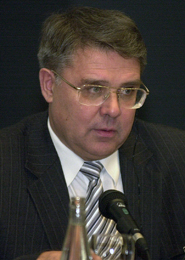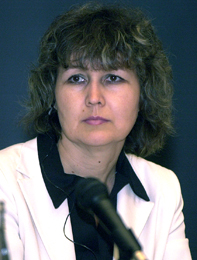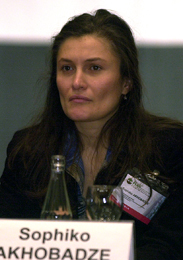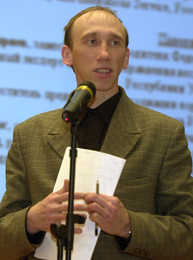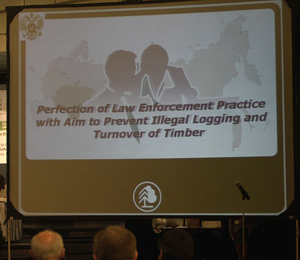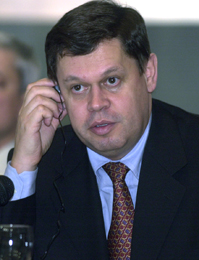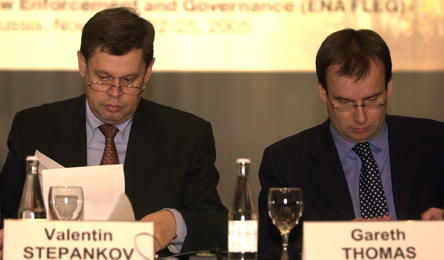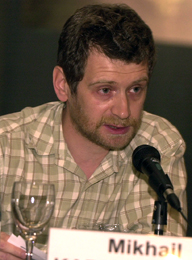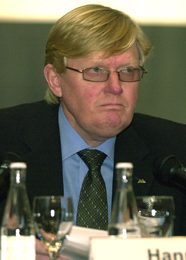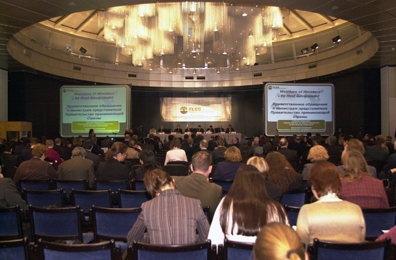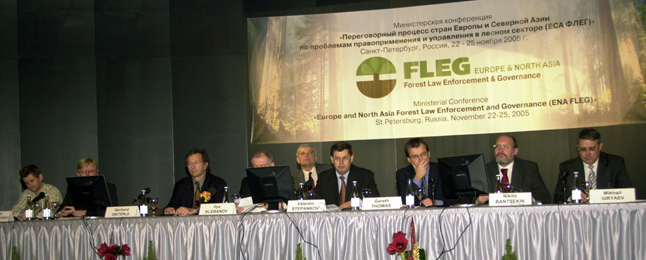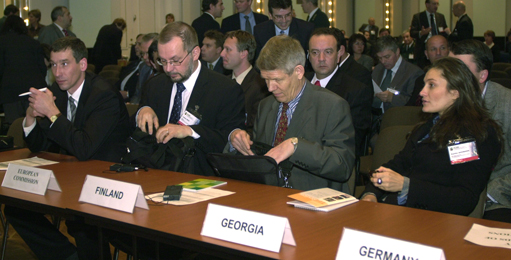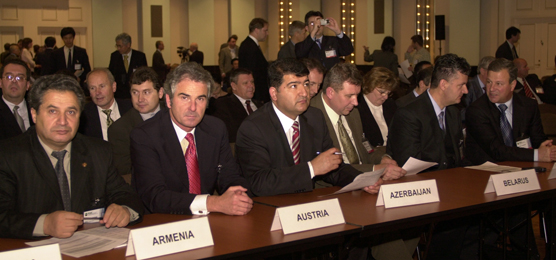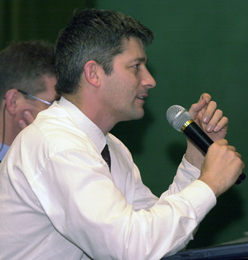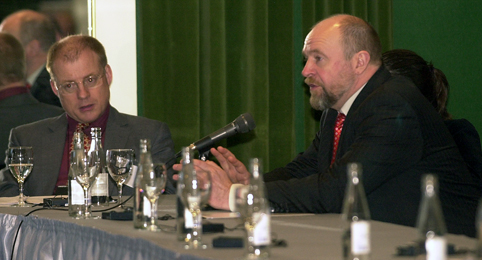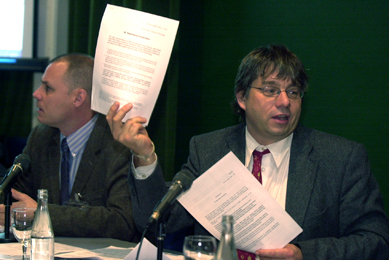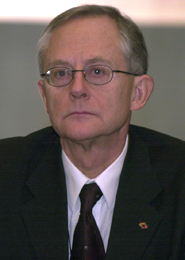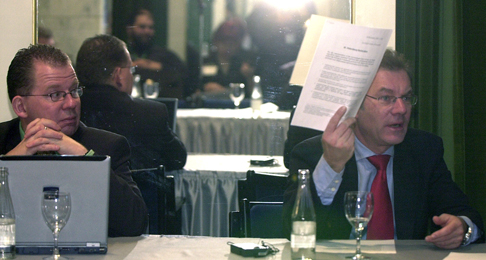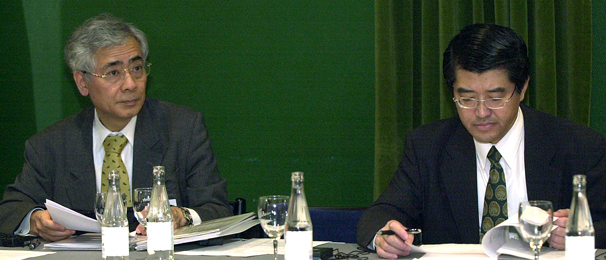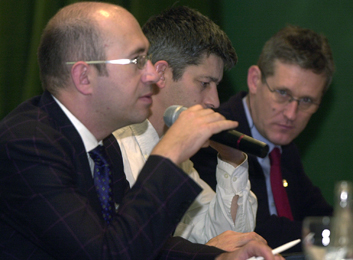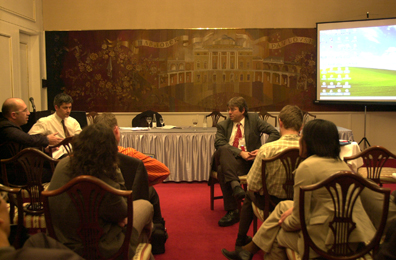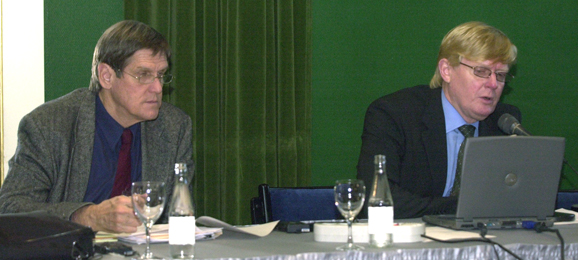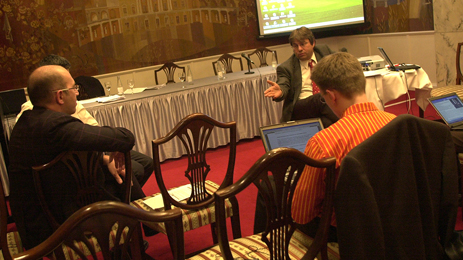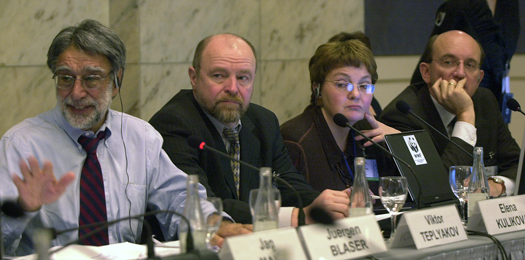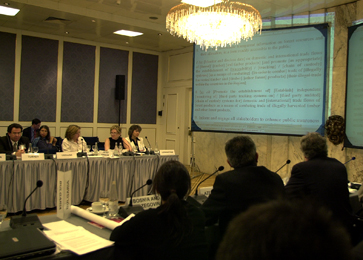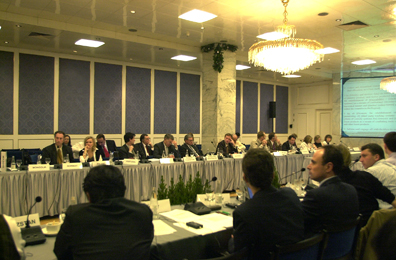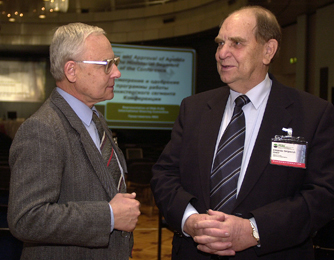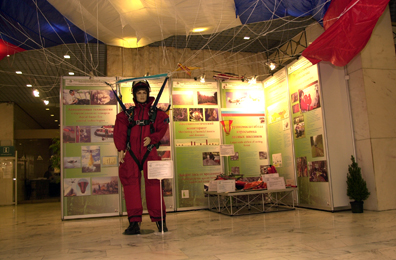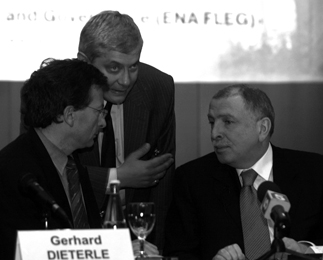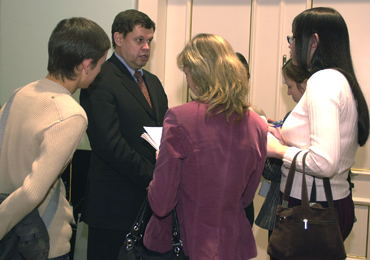|
|
|
Highlights from Thursday, 24 November
On Thursday, delegates continued negotiating the Ministerial Declaration and Indicative List of Actions. In the morning, a thematic session on resource access to local populations and equity in resource utilization was also held. Negotiations continued in the afternoon followed by a ministerial briefing session. The Civil Society and Industry Dialogue met to modify preambular language for consideration by the negotiators. Two Joint Sessions were convened during the day to report the status of the negotiations to civil society and industry.
|
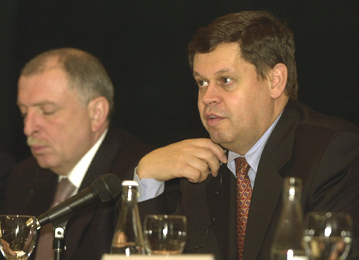
|
| Thematic and Learning Session: Ensuring Resource Access to Local Populations and Equity in Resource Utilization |
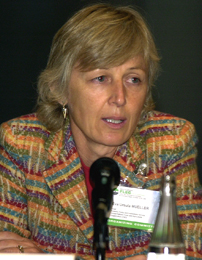 |
|
|
| |
|
Eva Müller, Food and Agriculture Organization, said that, while 84 percent of world forests are publicly owned, there is a global trend towards increased community and local ownership. She also noted that for many poor people and communities, resource access is not limited by lack of tenure, but by inadequate legislation concerning forest use. Müller also noted that FAO is currently studying the legal obstacles to sustainable forest management by communities and small holders, plans to identify legal provisions necessary for better access to legal forest management, and will support ENA countries in the implementation of the IAP.
Mikhail Giryayev, Federal Forestry Agency, Russia, discussed illegal logging in Russia, noting that illegal logging consists of tree felling without a permit and is often carried out by local actors. He also said that addressing the problem requires updating current legislation, and ensuring that consumers develop adequate procurement policies.
Gulusa Vildanova, Ministry of Agriculture and Water Resources, Uzbekistan, said that while logging on forested land is a problem, indigenous populations should not be barred from using forests for livelihood purposes. She offered three solutions to the problem, including secure access for local forest users, alternative energy supplies to local communities, and educating local populations on how to lessen their environmental impact. |
 |
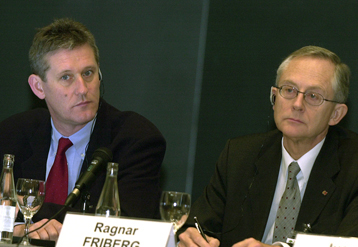 |
|
Rodion Sulyandziga,
Russian Association of Indigenous Peoples of the North, Siberia and the Far East, said industrial-scale use of Siberian forests affects, mostly negatively, indigenous peoples' way of life. He also said that: Russian forest legislation benefits large-scale forest operators; local populations lack access to the political system and; logging that threatens indigenous peoples' livelihoods must be deemed illegal. He proposed that the state account for local interests in forest management, called for environmentally sustainable felling that guarantees stable local incomes, and said that illegal logging can be curtailed by limiting road construction.
Duncan Pollard, WWF International, said the high cost of energy has increased fuelwood harvesting, the costs legal compliance for small producers may exceed the benefits, and that rural poverty is one of the main causes of illegal logging.
Ragnar Friberg, Stora Enso, said his firm relies on small-wood lot owners for its wood supply, and noted that the firms supplies these forest owners with assistance in forest management, permitting, scarification and restoration.
Sophiko Akhobadze,
Minsitry of Environmental Protection and Natural Resources, Georgia, co-chaired the session |
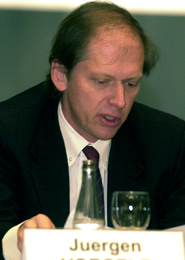 |
|
|
Juergen Voegele, World Bank (left), co-chaired the session
Dmitry Afinogenov, St. Petersburg Naturalists' Society, presented views from an NGO perspective |
|
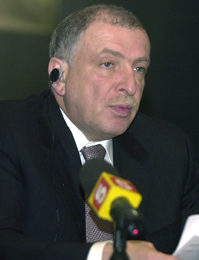 |
|
|
Ilya Klebanov, Plenipotentiary Representative of the President of the Russian Federation in the Northwestern Federal District, acknowledged that the problem of illegal logging in the northwestern district is due to its high quality timber. Noting that illegal logging undermines the image of Russian forestry, he said efforts to combat illegal logging should not burden legal producers and could include upgrading existing legislation, technology, increasing the demand for legal forest products, and increasing compensation for legal producers.
Gareth Thomas, Parliamentary Under Secretary of State, UK, noted various aspects of the European Union Forest Law Enforcement, Governance and Trade Plan of Action, including voluntary licensing requirements for legal forest product imports, implementation of such requirements through bilateral partnerships, and capacity building. He also said that indiscriminate trade bans will not solve the problem of illegal logging, noting that multilateralism and NGO participation, in part, will.
Valentin Stepankov, Deputy Minister of Natural Resources, Russian Federation, stressed the need to eradicate threats to nature, and noted the important part that FLEG has to play in this regard. He also said that combating illegal logging requires, in part, partnerships between developed and developing countries and other agencies and organizations, noting that consideration of future measures must be based on FLEG requirements.
|
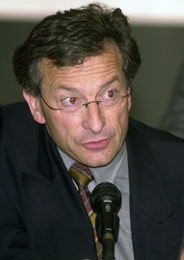 |
|
| Gerhard Dieterle, World Bank (left) |
Mikhail Karpachevsky, Taiga Rescue Network, for NGOs, noted that stakeholder involvement is key to the success of the ENA-FLEG process, and that all countries present at the conference share responsibility for resolving the issue of illegal logging. He outlined four NGO priorities for ENA-FLEG: time-bound NAPs for all participating countries; a clear follow-up process; addressing corruption and promoting transparency; and ruling out destructive legislation and practices. In closing, he stressed the leading role of governments in implementing commitments undertaken in the Ministerial Declaration, and civil society's involvement in the follow-up process.
Hannu Valtanen, Finnish Forest Industries Federation, delivered the industry statement to the Ministers, noting that the private sector is already implementing practical measures on combating illegal logging such as codes of conduct and wood tracking systems. He highlighted three key ENA-FLEG aspects from the industry perspective: consistent and time-bound NAPs; legal frameworks that promote good governance and sustainable forest management; and promoting trade in legally, equitably and sustainably produced forest products. He stressed that laws and regulations in the forest sector should be consistent with WTO rules, and that law enforcement is a government function.
|
Joint Sessions between governments and civil society and industry |
| Stuart Wilson, Forest Monitor, during the civil society and industry dialogue (left) and Viktor Teplyakov, Russia, and Co-Facilitator of the negotiations, during a briefing with the CSID (right) |
Co-Facilitator Jürgen Blaser holds up the revised version of the Ministerial Declaration (left) and facilitator of the industry contact group Ragnar Friberg, Stora Enso (right) |
| Takashi Fujiwara, Japan Federation of Wood Industry Associations (lefT) |
| Jonathan Buckrell, Global Witness (left) and Jürgen Blaser briefs civil society on progress being made in the intergovernmental negotiations |
| Robert Kirmse, World Bank, and Hannu Valtanen, Finnish Forest Industries Federation |
| Intergovernmental Negotations Session |
Co-Facilitators Jag Maini, Canada, Viktor Teplyakov, Russia, and Elena Kulikova, Russia |
| Delegates hard at work during the intergovernmental negotiations |
|
|
|
|
|
|
|
|
|






